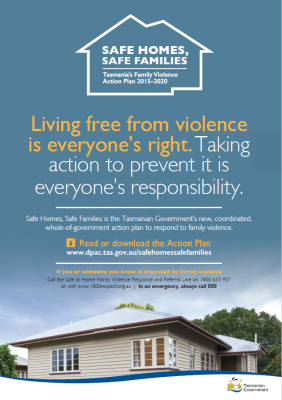If it is an emergency and someone is being hurt – Call 000.
For non-urgent reporting to Tasmania Police call 131 444.
1800 RESPECT – 1800 737 732
National Sexual Assault, Family & Domestic Violence Counselling Line for any Australian who has experienced, or is at risk of, family and domestic violence and/or sexual assault. Includes guidance on healthy relationships, safety planning and tips on how to respond.
24 hr Family Violence Response and
Referral Line – 1800 633 937
If you or someone you know is impacted by family violence.
Family Violence Counselling and
Support Service – 1800 608 122
Safe at Home. Offers professional and specialised services to assist children, young people and adults affected by family violence in Tasmania.
1800 608 122 9am-midnight Mon-Fri and 4pm-midnight weekends and public holidays.
Child Protection Advice and Referral Service – 1800 000 123
Child and Family Services. To discuss concerns or to report child abuse.
Men’s Referral Service – 1300 766 491
No to Violence. Interpreters available on request. National relay service enabled.
Engender Equality – 6278 9090
(9.00am – 5.00pm Mon – Fri)
Engender Equality provides free and confidential counselling and support for women who are affected by abuse in an intimate relationship. Contact via phone or email. admin@engenderequality.org.au
SASS Sexual Assault Support Service
– 1800 697 877
SASS is a free and confidential support service for southern Tasmanian people of all ages who have been affected by any form of sexual violence. Redress Scheme Support Services across Tasmania.
MensLine Australia – 1300 789 978
Counselling service for men with family and relationship concerns. We’re here to help anywhere, anytime. Are you using family violence?
Family Advocacy and Support Service
Tasmania Family Advocacy and Support Service (FASS) provide free legal and social support to people affected by domestic and family violence.
What’s Ok at Home?
WOAH. Information, videos, apps, brochures, posters and lots more to help people understand what family violence is, why it happens, how to recognise it and how to help others who are experiencing it.
eSafety Women
Information about online safety for women experiencing family violence. The eSafety Women initiative of the Office of the eSafety Commissioner forms part of the Australian Government’s Women’s Safety Package to Stop the Violence.
DV-Alert
DV-Alert is a nationally recognised training program to help people recognise signs of domestic and family violence, respond with appropriate care, and refer people to appropriate services. The training is delivered by Lifeline. Find out more about DV-Alert here.
White Ribbon
There is an increasing spotlight being put on family violence at a national level. The White Ribbon campaign is an important one supporting change, with a vision that women live safely from men’s violence. Find out more about White Ribbon here.
Our WATCh
Our Watch is a national leader in the primary prevention of violence against women and their children in Australia. They work to embed gender equality and prevent violence where Australians live, learn, work and socialise. Find out more about Our Watch here.
Mission Australia
Mission Australia provide information and resources about domestic and family violence through their online portal. Find out more here.
Safe at Home
Safe at Home is the State Government program tackling family violence.
You can find more information about the program and services here.
According to Tasmania’s Family Violence Act 2004 (No. 67 of 2004), family violence means – any of the following types of conduct committed by a person, directly or indirectly, against that person’s spouse or partner:
1. assault, including sexual assault
2. threats, coercion, intimidation or verbal abuse
3. abduction
4. stalking within the meaning of section 192 of the Criminal Code
5. attempting or threatening to commit conduct referred to in subparagraph (i), (ii), (iii) or (iv)
or any of the following:
1. economic abuse
2. emotional abuse or intimidation
3. contravening an external family violence order, an interim FVO, an FVO or a PFVO


